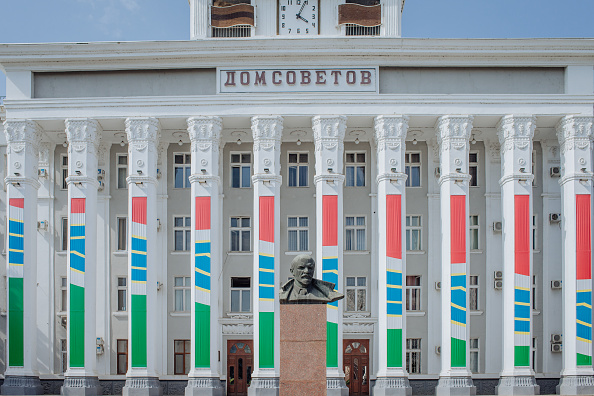The Irish writer C.S. Lewis had it right more than 50 years ago: “Of all tyrannies, a tyranny sincerely exercised for the good of its victims may be the most oppressive.” The line first appeared in a volume of essays called, God in the Dock. If you are familiar with Germany, as I am, go find that book and remember that line. Today the German state is screwing down censorship to silence the right-wing opposition, all for the good called “democracy.”
Germany’s Interior Ministry has now banned a right-wing media outlet that criticises its left-leaning government, in what some are calling the most aggressive move against press freedom since the Second World War. Suppressing opposition has long been a tactic employed by the Left, albeit usually with a certain amount of plausible deniability. The striking thing about this is how forcefully — how tyrannically — it was conducted.
Officers, some of whom were wearing balaclavas, raided the home and workplace of Compact magazine founder and chief editor Jürgen Elsässer in scenes reminiscent of Stalin’s purges. His assets, including his property and hard drive, were seized. The magazine website was taken down, and social media platforms as well as the official YouTube account were temporarily disabled.
Elsässer was not the only one targeted. All across Germany, employees’ private homes were raided. The outlets financial backers also had their assets seized and their homes raided. Was the presence of the mainstream media was a pure coincidence? It hardly seemed the fortuitous result of a happy chance.
Since the mainstream media arrived first, they were able to capture the crucial ‘perp walk’ images of Elsässer being led away by police in his dressing gown. In a partisan and fast-paced news cycle, the spectacle of a ritualised public relations humiliation is crucial.
Nancy Faeser, the minister responsible for the order, posted on X saying; “Today, I banned the right-wing extremist COMPACT Magazine. It agitates in unspeakable ways against Jews, against Muslim and against our democracy. Our ban is a hard blow to the right-wing extremist scene.”
I’m sorry, what? Democracy? Using the state as a weapon to intimidate and silence dissenting voices is not democratic. It is tyranny dressed in the robes of righteousness. As Elsässer says, Faeser “has shown us the ugly face of dictatorship.”
Compact was founded in 2010, The magazine, which has 40,000 readers and a 345,000-strong YouTube following, is vehemently nationalistic, anti-immigration, and anti-globalist. Known for its provocative covers, such as the one featuring former Chancellor Angela Merkel in a hijab, the magazine is a thorn in the side of the elite.
Many justifications have been offered for the dissolution of Compact. The magazine made a clear distinction between those with citizenship status and native-born people. Germany has enshrined in law legislation protecting numerous identities from offensive words, akin to the protected characteristics statutes granted to minorities in British hate speech laws.
According to Die Welt, the magazine was closed down for acting in a “combative and aggressive manner” in violation of this “constitutional order.” Welt claims that Compact covered issues like “corrupt politicians” and the “lying press.” It may not be to everyone’s taste, but it is not against the law. Lies in the media? There’s a shock.
Essentially, Welt is implying that you should avoid publishing stories on a dishonest media outlet, as the government may collude with the media to publicly demonise you and send masked police to your door.
The actions taken by the interior ministry are unprecedented. Freedom of the press is not something that can be taken away by government decree. Former Federal Minister of Defence and constitutional lawyer Rupert Scholz states that “A medium can only be banned if it represents a revolutionary position, i.e., calls for the overthrow of the existing order by force. But that would then have to lead to criminal proceedings.”
Stated differently, before Compact could be closed, Elässer would need to be arrested, tried, and found guilty in a court of law. It appears that he has not been charged as of this writing. However, for some reason, his business was closed down before any legal action could be taken. Ironically, some lawyers think it might be illegal if it turns out that the press was notified prior to the raid.
Furthermore, Faeser, it turns out, was a writer for Antifa Magazine, which was once classified as a left-wing extremist publication by the Office for the Protection of the Constitution (BfV), the same ministry that had previously labelled Compact as such.
The BfV represents the bureaucratic arm of the German state, carrying out the technocratic illiberalism of the ruling class. Collectively, the country possesses some of the strictest hate speech legislation in all of Europe.
Take the ministry’s use of the incitement to hatred law as justification for the magazine’s ban. Initially enacted in the aftermath of World War II as a bulwark against anti-Semitism, the legislation aimed to punish and criminalise anyone who instigates violence against a group based on that group’s race, religion, or ethnicity. Though it may sound admirable, the law is currently employed to demonise right-wing populists and silence state critics, particularly, the AfD.
Marie-Thérèse Kaiser, for instance. The 27-year-old member of the AfD had her conviction for inciting hatred upheld a few months ago after she used social media to share official data demonstrating that Afghan immigrants are disproportionately likely to commit sexual assault against women and girls in Germany.
Kaiser is merely one of many people the law has targeted. Thuringian AfD leader Björn Höcke was fined €13,000 after being found guilty of inciting hatred after concluding a speech in 2021 with the national socialist party’s former slogan ‘everything for Germany.’
These cases illustrate a profound hostility towards democracy. Each of them is committed to severely curtailing the power and influence of the AfD—the second-largest party in Germany. Former model Kaiser has thousands of mostly young followers on social media. As a tech-savvy millennial, she was an integral part of the party’s social media operations. Her conviction is based on the young people she was able to reach as much as the words she spoke.
The elite are right to feel threatened. In Germany, the younger generation is moving more and more to the right. According to one landmark study, 22% of people between the ages of 14 to 29 reported they would vote for the AfD. This was confirmed by the AfD’s nearly 17 per cent vote share among voters aged 16 to 24 in the most recent European Elections.
The political and media class assumed that right-wing populism was exclusive to baby boomers. For the first time, sixteen-year-old German teenagers were eligible to vote in this election. Our old masters are clearly running scared, as evidenced by the targeting of Compact’s YouTube page.
Germany’s political establishment has clamped down on its rivals, acting in an illiberal and authoritarian manner. By taking such measures, the Right will play into the victimhood narrative so often employed by modern identitarians on the Left.
The irony is that it will increase support for the hard Right. Following the announcement of the censorship of Compact, subscriptions to its YouTube page have increased by 3,000. The state ought to back off and allow people to express themselves instead of banning things. To counter “offensive” words, we need more, not fewer words. The best disinfectant, so the saying goes, is sunlight.





Spaniards don’t like €9.6bn a year tourists, but quite like illegal immigrants